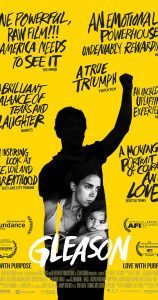Randal Rauser's Blog, page 133
December 27, 2016
Gleason: A Review
 Over the last couple weeks I’ve heard a lot of people exclaim what a horrible year it has been. I admit that I’ve grumbled a bit myself. However, I won’t do so anymore. Gleason has a way of putting things into perspective.
Over the last couple weeks I’ve heard a lot of people exclaim what a horrible year it has been. I admit that I’ve grumbled a bit myself. However, I won’t do so anymore. Gleason has a way of putting things into perspective.
This extraordinary documentary debuted earlier this year at the Sundance Film Festival. In a perfect world, Gleason would open wide at 4000 theaters while Suicide Squad would languish with one showing a day at the art house theater downtown. You see, nobody needed Suicide Squad, but the world needs a real superhero movie like Gleason. Anyway, the sad result of these inverted priorities is that we’re only learning about this film now, at the end of December. So to make up for lost time, watch it.
The film follows retired New Orleans Saint football player Steve Gleason and his family through five years of a diagnosis of ALS (Lou Gehrig’s Disease). Steve begins in 2011 with some tingling in his extremities. We leave him in 2016 wheelchair bound and breathing through a ventilator. More importantly, we leave him in awe of a courage, fortitude, and raw human inspirit that exceeds our mundane imagingings. The DC universe could learn a lot about superheros from this film.
From this day forward the Dictionary of Idioms will illustrate the expression “When life gives you lemons, make lemonade” with a picture of Steve Gleason. Really, that’s all you need. After his diagnosis he founded Team Gleason, a charitable organization devoted to improving the lives of those stricken with ALS by providing important technological aids. (They have since expanded their mandate to raise money for research to cure ALS.) In 2015 President Obama signed the Steve Gleason Act which secures Medicare/Medicaid funding for voice technology for those stricken with ALS.

Steve, Michel and his son Rivers (January, 2016). (AP Photo/Jonathan Bachman)
It hardly needs to be said that Steve is a hero. But in the kind of strength-through-weakness paradox at the heart of Christian faith, Steve’s power often comes in his vulnerability. In one poignant scene Steve visits a newly erected statue in New Orleans which honors his storied football career. He later reflects that five minutes before he returned home that day, he defecated all over his wheelchair. Few people see that side of his heroic life. But he still shares it with us, and that in itself is extraordinary.
Needless to say, Steve’s caregivers are heroes in their own right. Chief among them is his long-suffering wife Michel. In one scene she insists she doesn’t want to be a saint. She only wants to be a human. Should we tell her that no saint ever set out with that goal in mind? They simply desired to love and help those in their midst.
Spirituality is a deep and rich seam to be mined in this film. Steve’s complex, painful, and poignant relationship with his father provides a catalyst for this theme to emerge. His dad appears to be a fundamentalist or charismatic Christian of some sort, one who wrestles with his own demons, including his fear that his son is not saved. In one of the film’s most heartbreaking scenes, Steve and Michel accompany his father to a faith healer’s healing service. Worth a shot, right? The speaker encourages the group to speak out their own healing (a practice that suggests he represents the aberrant Word of Faith form of charismatic Christianity). Steve bravely attempts to run in front of the congregation to illustrate that he is healed. The result is, to say the least, hard to watch.
In another agonizing scene, Steve, his language now severely incapacitated, shouts out to his father that his soul is saved and it hurts him deeply when his father suggests otherwise. His father asks for forgiveness and embraces his son in tears.
Steve Gleason may never be healed from ALS, but just the same Gleason is an extraordinary chronicle of healing, growth, heroism, and purpose cultivated in the midst of deepest adversity. This is a hero I can believe in.
The post Gleason: A Review appeared first on Randal Rauser.
December 24, 2016
A Journey Through Christmas Posts Past
 It’s a crazy time of year, innit? Yesterday I foolishly ventured into Costco to do some last minute shopping. This was the lineup just to get to the lineups for the cash registers.
It’s a crazy time of year, innit? Yesterday I foolishly ventured into Costco to do some last minute shopping. This was the lineup just to get to the lineups for the cash registers.
Is it any surprise that many people think “relaxing Christmas holiday” is an oxymoron?
In light of all the craziness, I say we take some time to relax and reflect this December 24th. In celebration of this festive season, I’m providing links to three of my top Christmas posts of the past. So come, and let’s see what’s waiting for everyone under the Christmas tree!
Oh, this first one is exciting. It heralds from 2012 and provides a link to a debate I had with atheist apologist Jonathan Pearce on the historical reliability of the nativity narratives.
Next, from 2013 we have my coveted 2013 list of the very best Christmas songs. And just so you know, neither Bing Crosby’s “White Christmas” nor Mariah Carey’s “All I want for Christmas” made the list.
Finally, we have my 2014 audio Christmas greeting which even includes a poignant exchange with Linus of Peanuts fame.
Merry Christmas to all, and to all a good night.
The post A Journey Through Christmas Posts Past appeared first on Randal Rauser.
December 23, 2016
Mock beliefs, not people, Revisited
Over the last few years I’ve repeatedly encountered atheists who are unapologetic about mocking Christians and other “religious” people (i.e. the outgroup). Often they justify this practice by insisting that they are mocking beliefs, not people. The silver lining here is that these folks still sense the need to justify their bad behavior. Other individuals see no need for a defense as they are enthusiastic mockers of people and their beliefs.
If the former group retains a laudable need to justify their behavior, the latter group is at least more intellectually honest: mocking a person’s beliefs is mocking the person. If you’re going to build yourself up by mocking others, at least be honest about what you’re doing.
I first addressed this issue three years ago in an article titled “Mock beliefs, not people“. But given that the practice still persists (incredibly, that article didn’t solve the problem once and for all: I’ve encountered the same justification of mockery twice in the last week) I thought I’d return to the issue.
Here I’ll make two points.
First, mocking the belief a person holds is like mocking the clothing they wear. The belief, like the clothing, is an extension of the person. If you make fun of Mario’s coat, don’t expect that saying “I’m not mocking you Mario. I’m only mocking your coat!” will get any traction. Mario will be offended, and rightly so. The same goes if you proceed to mock Mario’s beliefs.
Second, the more important a belief is to an individual, the more offensive it is to mock that belief. If Ted just happens to be drinking a Budweiser with lunch, you can probably get away with mocking his beer choice. But if he takes annual pilgrimages to the Anheuser-Busch Brewery in St. Louis and keeps a stable of Clydesdales in his back pasture, then making fun of his taste in beer could go sideways very quickly.
The same goes with politics. And many of us have discovered this the hard way over the last couple months as we’ve engaged in some rather strained conversations with family, friends, and colleagues over their voting choices. If you took that disagreement to the next level by mocking your interlocutor’s choice to vote for Donald (or Hillary), you can attest first hand to the fact that mocking voting choices tends to foment offense. And there’s an obvious reason for this: by mocking a person’s voting decision, you’re casting aspersions on their wisdom, values, and vision of the good society. It’s no surprise that they take offense.
Needless to say, the same goes when you mock a person’s religious (or irreligious) beliefs. To mock those beliefs goes to the core of a person’s identity.
To sum up, if you are so insecure in your own identity that you need to mock others, then by all means do so. It’s a free country. Just don’t delude yourself into thinking you’re doing anything other than mocking the person … and polluting the public square of civil discourse while you’re at it.
The post Mock beliefs, not people, Revisited appeared first on Randal Rauser.
December 22, 2016
An Atheist and a Christian on Bob Dutko’s Show
Yesterday Justin Schieber and I were interviewed by Bob Dutko of WMUZ in Detroit to discuss An Atheist and a Christian Walk into a Bar. While I recorded the show via online audio stream, unfortunately I cut the recording too soon after we hung up. (I didn’t realize the show is on what seems to be about a 1 minute delay.) As a result, we lost the last minute or so of the interview. Mea culpa.
To make up for my foible, I edited out the commercials. 
December 21, 2016
God and Answered Prayer: A response to Justin Schieber
I guess this is the week of responding to tweets. Our latest helping comes from my coauthor Justin Schieber:
When somebody thanks God for helping them find their keys they betray their belief in a God with some profoundly misaligned priorities.
— Real Atheology (@RealAtheology) December 21, 2016
Before I proceed to offer a response, let’s put this in perspective with a concrete example. Mrs. Brown goes out once a week to meet her friends for a game of bridge. This is her greatest joy since her husband’s passing at the age of 90. But this morning she cannot find the keys to her Oldsmobile. As the worry grows that she will miss her cherished bridge game, she feels the panic settling in. In that moment, she closes her eyes and prays “Dear God, please help me find my keys so I may see my friends and find some small joy in these long, lonely days. Amen.” With that she turns around and a glint catches her eye from behind the potted fern. Could it be? She walks closer and is delighted to find that it is, indeed her keys. In a moment of overwhelming gratitude she thanks God for helping her find her keys.
According to Justin’s tweet, in virtue of thanking God for helping her find her keys, Mrs. Brown reveals a belief in God with “some profoundly misaligned priorities.”
Oh really? Like what?
Perhaps Justin is thinking something like this: “God could have protected civilians in Aleppo. But instead, he chose to help Mrs. Brown find her keys. Any person who chooses to help a person find their keys instead of helping war refugees has profoundly misaligned priorities. Therefore…”
Unfortunately, this kind of reasoning reveals a deeply confused understanding of divine action. God’s action is not a zero-sum game as if his acting in one place precludes him acting in another. God is by definition omniscient, omnipotent, and perfectly good. So if God answers one prayer in a way that visibly benefits some persons (e.g. Mrs. Brown) but he fails to answer another prayer in way that visibly benefits other persons (e.g. war refugees), it is not because he has “profoundly misaligned priorities.” Rather, it is because he has morally sufficient reasons for responding in this fashion. And of course the theodicists have provided us with many accounts of what this might be.
That brings us to our second possible interpretation. Perhaps Justin’s real target is the alleged inadequacy of all theodicies, at least as regards this specific issue. On this take, Justin would be arguing as follows: the fact that apparently trivial prayers are answered (e.g. Mrs. Brown’s keys) while other more serious prayers are not answered (e.g. those of war refugees) reveals that no God exists. To be sure, there could be a subdivine being who is the object of these prayers, but if there is then he has “profoundly misaligned priorities.”
However, if that is the claim then Justin has only given us the conclusion He still needs to provide the supporting argument against theodicies.
In sum, I see no reason to think that thanking God for finding your keys necessarily reveals that God has profoundly misaligned priorities. As for Mrs. Brown, she is perfectly within her rights to be thankful to God.
The post God and Answered Prayer: A response to Justin Schieber appeared first on Randal Rauser.
On not having enough faith to be an atheist
Apparently this week Twitter is my muse. The latest tweet addresses another one of those irritating memes (though it does so critically). I speak here of the meme that says faith is something like belief without adequate evidence. When it comes to public figures propagating this meme, the most egregious offender in recent years is arguably Peter Boghossian. In the past I’ve even listed this meme in various forms as one of the worst arguments against Christianity.
But this article isn’t about atheist offenders. It’s about Christians. Here’s the tweet from Harrison Jennings:
It's interesting that so many apologists insist that "faith" doesn't mean lack of evidence, and yet still they say stuff like this https://t.co/bb1D80zIe9
— Harrison Jennings (@hhjennings) December 15, 2016
And here’s the tweet he’s responding to:
Why I don't have enough faith to be an atheist https://t.co/9e5IVcXElb
— Ratio Christi (@RatioChristi) December 15, 2016
Excellent point! When Christians say they don’t have enough faith to be an atheist (as in the title of this article and Frank Turek’s popular book) they implicitly draw on the definition of faith as a disposition to believe in the absence of appropriate evidence.
And just in case my atheist friends think this meme provides tacit evidence that Christians really do define faith in this manner, let me be the first to pop your balloon. In point of fact, this doesn’t reflect common Christian usage. Rather, it is little more than a rhetorical boomerang, an attempt to hoist atheists with their own petard.
But as Jennings points out, that hardly excuses it.
The post On not having enough faith to be an atheist appeared first on Randal Rauser.
December 20, 2016
Are you (ever) embarrassed to be human?

Grayson Smith: just your everyday three year old hero.
I am. Today, at least, I am.
Many things have happened this week which would be sufficient to induce that misanthropic state of mind. But this week the straw that broke this camel’s back came with the story of Grayson Smith, a terminally ill three year old who suffers from more life-threatening medical conditions than most people will ever have to face.
And still he smiles.
In particular, he smiles in the picture where he is holding a pumpkin, the same picture that became a vicious internet meme mocking his facial deformity with the catchphrase: “That face you make when your parents are actually cousins.”
The person that made that “meme” leaves me embarrassed to be human. The people that laughed at it, tweeted it and liked it on social media also leave me embarrassed to be human. “That race of bipedal creatures on the third rock out from the sun? No, I’m not with them. I’m from, er, somewhere else.”
But as embarrassing, infuriating, and callous as I find the anonymous internet trolls, I find their inhumanity to have met its match in Grayson Smith himself, a child whose bravery, strength, and winsome smile leave me in awe.
So on second thought, maybe being human isn’t so bad after all.
The post Are you (ever) embarrassed to be human? appeared first on Randal Rauser.
God sacrificed himself to himself, blah blah blah
Here’s another retweet from Jeff Lowder at Secular Outpost. (And keep in mind that retweeting is not endorsing.) This one perfectly illustrates the problem I highlighted in my previous article “On Scientific (and Philosophical and Theological) Ignorance“:
Atheist: Because god sending himself to sacrifice himself to himself to save us from himself is a bit too much. #atheism #atheist #Atheists pic.twitter.com/jPSKUx1Uig
— Linda Beatty (@LindaBeatty) December 8, 2016
This is one of the more persistent atheist memes that trade on bracing theological ignorance. Indeed, I just addressed this very meme a couple weeks ago. But strawman caricatures die hard. The worst part about this version of the meme is that it suggests the person who strawmans atonement theology somehow does so out of respect for logic.
Is it too much to ask the atheists who endorse this kind of nonsense to invest a bit of time in reading a few books on the doctrine of atonement so they may learn both what it is that Christians actually do believe about atonement and where Christians disagree?
Apparently many believe it is too much to ask. But I’ll keep asking just the same.
The post God sacrificed himself to himself, blah blah blah appeared first on Randal Rauser.
December 19, 2016
On Scientific (and Philosophical and Theological) Ignorance
Today I came across the following retweet courtesy of Secular Outpost. (I must say, Twitter is an endlessly fecund resource for blogging ideas.)
Scientific ignorance pic.twitter.com/fcERsq3gvb
— Michael Jon Martin (@mikejmartin) December 19, 2016
While I might word things a little differently, I share the exasperation of this meme at those who opine on matters of which they are clearly not qualified.
My only caveat — and it’s a big caveat — is that the point is not limited to science. It extends to other areas, including two fields that are the frequent target of pop internet infidels: philosophy and theology.
When it comes to philosophy, I typically run into this problem in the fields of philosophy with which I’m most familiar: philosophy of religion and epistemology. Throw a Nerf ball into the exhibit hall at a skeptic convention and you’ll likely hit people who have said stuff like “I follow reason, not faith” and “There is no evidence for God’s existence at all.” Statements like this are borne of a bracing ignorance in fields like epistemology and philosophy of religion.
The same point applies to the field of theology (and in my case, Christian theology). The idea that a person who has never studied the fields of hermeneutics, biblical theology, historical theology, and systematic theology, is somehow equipped to critique (or dismiss) these fields is every bit as absurd as those who dismiss fields of inquiry in philosophy or science.
Let me add that I am not claiming one needs a formal degree in philosophy or theology (or science) to critique the arguments of philosophers or theologians (or scientists). Brilliant people can learn independently, so in each case we should judge an individual based on the merits of their analysis. And the starting point for evaluation is this: are you familiar with the pertinent concepts, terms, and issues that frame the technical discussion? Formal study and degrees is a means to that end, but it isn’t an end in itself.
To sum up, those who opine on scientific matters of which they have no knowledge merely demonstrate their own hubris and ignorance. Christians sometimes engage in this behavior, particularly in areas like those mentioned in the meme as well as others, most notably climate change. But atheists often engage in this same behavior. So we should be sure to call out this fatuous analysis whenever and wherever we see it.
The post On Scientific (and Philosophical and Theological) Ignorance appeared first on Randal Rauser.
Omran and the Angels of Aleppo
The other day I came across this image via Peter S. Williams’ Twitter feed.
Very moved by this amazing picture by the artist Judith Mehr, who wanted to depict Omran from Aleppo in the care of angels. pic.twitter.com/heDO12Y7x5
— Paula Gooder (@paulargooder) December 16, 2016
This is a fascinating picture which juxtaposes a contemporary viral image from the 24 hour news feed with classic Christian iconography. While the horrors of this world are undeniable, God (and his agents) work behind the scenes, healing, protecting, encouraging, and bringing redemption and his Kingdom.
Sometimes one might get a peak behind the veil. But other times — too many times — it seems that God is not visible or active in the carnage of our world. And for goodness sake, where are his angels?
But I have news for you. If you go to Aleppo you can see God’s angels working in the midst of the rubble, saving and comforting children like Omran everyday. The ones you can see are flesh and blood human beings. They’re called the White Helmets, and they are an extraordinary group of civilian volunteers who work tirelessly in Aleppo and surrounding regions to dig people out of bombed buildings.
Over the last five years the White Helmets have saved more than 70,000 people, including this infant who was dug out of the rubble in 2014 (and is a healthy precocious toddler today):
Tragically, the man who pulled that infant from the rubble, 31 year old father and husband Khaled Omar, was killed in a Russian airstrike this past August.
Omar worked tirelessly to save the innocent. Day after day he would plunge into the darkened rubble to seek out human lives, ever wary of the bombs that could end his life in an instant. He didn’t seek fortune or fame, he only sought the next life he could save. A hero by any measure, one whose dusty work boots I am not worthy to clean, and yet just another one of the angels of Aleppo.
The post Omran and the Angels of Aleppo appeared first on Randal Rauser.




